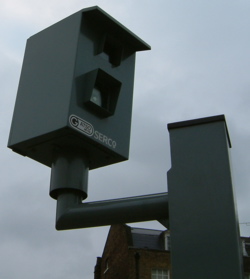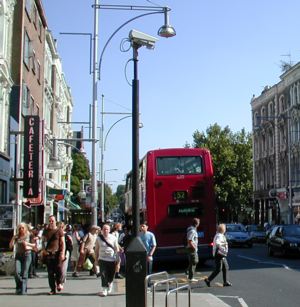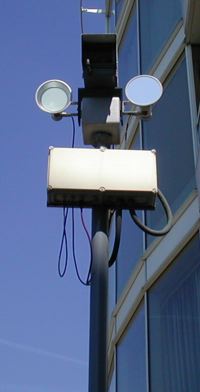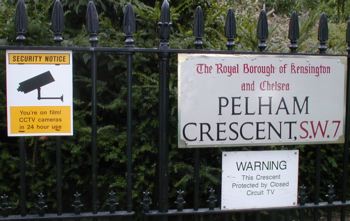Provoked by a couple of the comments on this, I’ve just posted a potentially rather boring blog posting about the problem of the potential boringness of blog postings, at my Culture Blog. But I don’t want to go on about it here.
|
|||||
|
Over wide areas of the urban first world, the Panopticon State is already very much a reality. Folks like us, the contributors to Samizdata.net, White Rose and the grizzled veterans over at Privacy International cry out warning pretty much daily alerting people not so much about the simple fact of surveillance per se but rather surveillance plus data-pooling. Yet it is important to draw people attention to the basic facts and encourage them to notice the evidence right in front of their eyes, peering down at them like menacing mechanical crows perched on metal branches jutting from walls everywhere, that we are increasing under surveillance by the state directly… 
…and by companies whose surveillance footage states are increasingly reserving themselves the right to gain access to on demand… 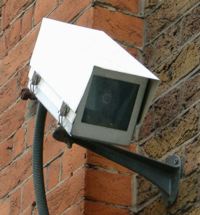
But the people who would like our every move recorded and subject to analysis are not fools. They would rather you did not actually notice what is before your very eyes and so we are seeing the second age of CCTV: more aesthetically pleasing and less intrusive cameras, rather than the stark utilitarian carrion crows which currently predominate… 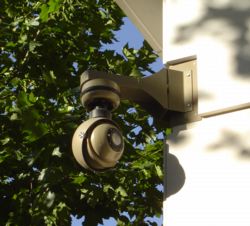 …rounder, blending in with the background… 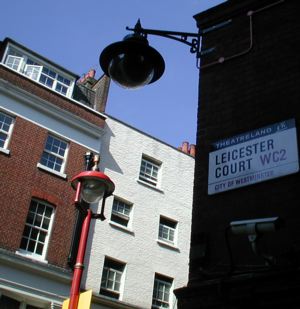 …looking more like the lighting fixtures than the all-seeing-eye. The second age of security cameras is at hand…still quite literally staring you in the face, but increasingly hiding in plain sight, counting on a mixture of clever design and the fact that familiarity breeds contempt. But Big Brother is still watching, only with a little more style and taste now. That just makes it more dangerous.  (Cross-posted from White Rose) Over wide areas of the urban first world, the Panopticon State is already very much a reality. Folks like us, the contributors to White Rose, Samizdata.net and the grizzled veterans over at Privacy International cry out warning pretty much daily alerting people not so much about the simple fact of surveillance per se but rather surveillance plus data-pooling. Yet it is important to draw people attention to the basic facts and encourage them to notice the evidence right in front of their eyes, peering down at them like menacing mechanical crows perched on metal branches jutting from walls everywhere, that we are increasing under surveillance by the state directly… 
…and by companies whose surveillance footage states are increasingly reserving themselves the right to gain access to on demand… 
But the people who would like our every move recorded and subject to analysis are not fools. They would rather you did not actually notice what is before your very eyes and so we are seeing the second age of CCTV: more aesthetically pleasing and less intrusive cameras, rather than the stark utilitarian carrion crows which currently predominate…  …rounder, blending in with the background…  …looking more like the lighting fixtures than the all-seeing-eye. The second age of security cameras is at hand…still quite literally staring you in the face, but increasingly hiding in plain sight, counting on a mixture of clever design and the fact that familiarity breeds contempt. But Big Brother is still watching, only with a little more style and taste now. That just makes it more dangerous.  From WorldNetDaily:
This is from the ‘The Basra Rose’, the Iraq deployment section of the Red Rose, the newsletter of the 1st Battalion The Queen’s Lancashire Regiment:
In other words, it is a tad hot in Basra. Just so you know. 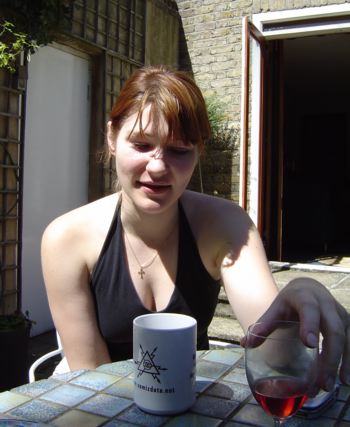
Adriana sez: “Statism is enough to drive a girl to drink”.
Granny sez: “Don’t you have some flavour other that ‘samizdata.net flavour’?” But what do you think the captions be? I am quite sure that I am not alone in having regrets about something I should have done but didn’t. There must be loads of people who once fancied a dabble on some dark-horse penny-share but decided not to take the risk and then watched it go stratospheric. Or perhaps they once thought of a great product -idea but couldn’t be bothered to pursue it only to see that same product in the shops five years and later selling like hot-cakes. For me, it was the hit-stage play that I envisaged but never wrote. It was about a young couple who met at University in the sixties while they were both throwing themselves headlong into the counter-culture revolution as a means of rejecting the stuffy, conservative values of their staid, suburban parents. Fast forward three decades and they are now both pillars of the Nulabour establishment. He is a journalist and she is a human rights lawyer. Their Islington home is a shrine to their innumerable cherished causes. Life is a series of earnest campaigns fuelled by a diet of polenta with rockett salad, washed down by ‘fairtrade’ Nicaraguan coffee. They are comfortable, happy cadres of the metropolitan elite blessed with an unshakeable moral certainty. Until, that is, their teenage daughter returns home from University where she has discovered Ayn Rand and become a fiery devotee of free-market capitalism. Then the comedy begins. At the time I was jobbing as a scriptwriter churning out formulaic boilerplate for cable television and being quite handsomely rewarded for doing so. I had the basic characters and the outline plot but I suppose I was too addicted to the money stream to take the time off that actually writing the damn thing would have necessitated. So it never got written. And now, it’s too late. What would have been groundbreaking comedy has been overtaken by reality: [From UK Times so no link]
Looks like I was ahead of the curve.
The ’68 generation may just be about to learn that what goes around, comes around. And, by the way, a note to all readers: if you have a good idea, act on it immediately. The world will not wait for you. It certainly is. Says Michael Blowhard:
Go here and do what Michael says. This one is my favourite. Mouse click on one of the row of dots at the bottom, and enjoy. Michael again:
Indeed. Anyone here know of other stuff like this? And I agree with most of what he says! Norman Geras, who I had not previously encountered until he recently fired up his blog , has an interesting take on things from what appears to be pretty well left of center. I was particularly taken with his thoughts on the war, which echoed some of my own but were much better put (less spluttering and profanity, for the most part).
A spot of googling reveals that Mr. Geras is Professor in the Department of Government at the University of Manchester. His books include Marx and Human Nature: Refutation of a Legend, Solidarity in the Conversation of Humankind: The Ungroundable Liberalism of Richard Rorty, and Men of Waugh: Ashes 2001, and he shows up in rags like Imprints: A Journal of Analytical Socialism (I confess to Windexing my computer screen after that web page opened up). One is always searching for sane lefties to try to gain some insight into the cult of the state, and Norm looks like he may be worth keeping an eye on. This from Harry Mount in the Telegraph today, on speed cameras:
It’s worth reading more of it of course, but that struck me as the killer para. In Does Education Matter? Alison Wolf attacks, tin the words of the book’s subtitle, “myths about education and economic growth”. Here are a few paragraphs from the Introduction: From the premise that a full-blown ‘knowledge economy’ is arriving now on our doorsteps, it is easy to slip into prescribing more and more of the raw material which apparently makes this possible: education. And of course it would be stupid to deny that education is central to any modern economy. Imagine the UK today – or the USA, or Greece, japan, Brazil – being run by a population. which is more than go per cent illiterate – the level of eleventh-century England.’ Imagine Microsoft or British Aerospace research and development in the hands of people all of whom had left school after only a primary-school education, or a drug industry dependent on people whose academic training was the intermingled science and alchemy of Newton’s day. Who could doubt that education matters? But what doesn’t follow is that vast amounts of public. spending on education have been the key determinant of how rich we are today. Nor is it obvious that they will decide how much richer, or poorer, we will be tomorrow. The simple one-way relationship which so entrances our politicians and commentators – education spending in, economic growth out – simply doesn’t exist. Moreover, the larger and more complex the education sector, the less obvious any links to productivity become. Developed countries have now moved well beyond providing basic education. for all, and instead spend more and more on higher education, technical provision, vocational programmes, and adult training. These are my main subject matter, for they are also the main recent targets of government policies inspired by ambitions for growth. Unfortunately, while an overwhelmingly strong case can be made for the state’s responsibilities in basic education – and, indeed, for the latter’s economic importance – not one of these newer enthusiasms deserves any such.accolade. Alison Wolf Silicon.com reports that David Blunkett is being called upon to incorporate his national ID card proposals into wider strategy to boost the adoption of smart cards for authenticating use of e-government services. Concerns have been raised in a new policy framework on a ‘joined-up’ e-government smart card strategy issued by the e-Envoy this week that local and central government bodies will develop their own card schemes that will not be interoperable and result in people carrying a wallet full of different cards for different services. The document said:
‘Multi-application’ cards have been touted by the e-Envoy for some time and another possibility put forward in the framework is the piggybacking of government services onto new or existing private sector schemes. |
|||||

All content on this website (including text, photographs, audio files, and any other original works), unless otherwise noted, is licensed under a Creative Commons License. |
|||||
